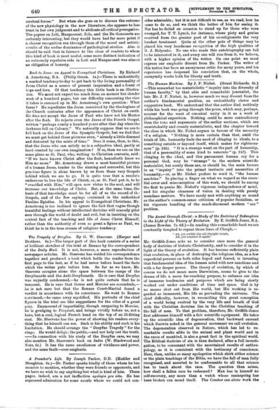The Tragedy of Dreyfus. By G. W. Steevens. (Harper and
Brothers. 5s.)—The larger part of this book consists of a series of brilliant sketches of the trial at Rennes by the correspondent of the Daily Mail. It is not, however, a mere reproduction of newspaper articles. Mr. Steevens has welded his correspondence together and produced. a book which holds the reader from the first page to the last, as if he had never before heard the facts which the writer puts before him. So far as we know, Mr. Steevens occupies alone the space between the camps of the Dreyfusards and the Anti-Dreyfusards. He is sure that Dreyfus was unjustly condemned,—he is not quite certain that he is innocent. He is sure that Gonse and Mercier are scoundrels,— he is not sure but that the Rennes Court-Martial found a verdict in accordance with its conscience. He went to Rennes convinced,—he came away mystified. His portraits of the chief figures in the trial are like suggestions for the roles of a great piny. Enamoured of impartiality, though unsparing to Mercier, he is grudging to Picquert, and brings vividly before us, not a hero, but a cool, logical French head on the top of an ill-fitting coat. Mr. Steevens has the power of showing his readers every- thing that he himself can see. Such is his ability and such is his limitation. He should arrange the " Dreyfus Tragedy" for the stage. He would delig1,1: the public,—and not help out the truth. —In connection with his study of the Dreyfus case, we may also mention Mr. Steevens's book on India (W. Blackwood and Sons, 6s.) It has the same excellences of vividness and power, and the same fault—over-emphasis.






















































 Previous page
Previous page